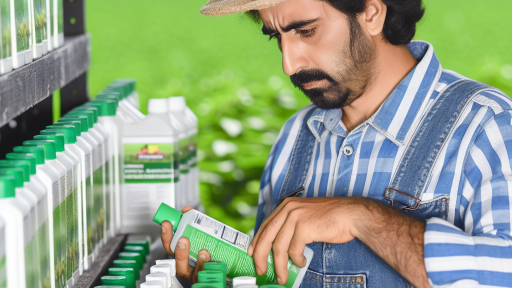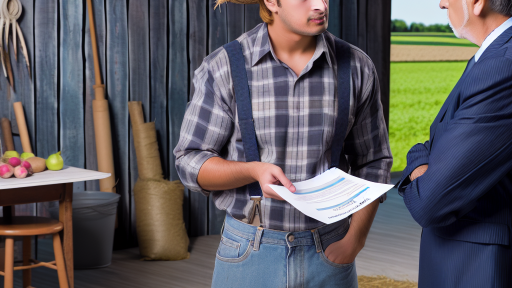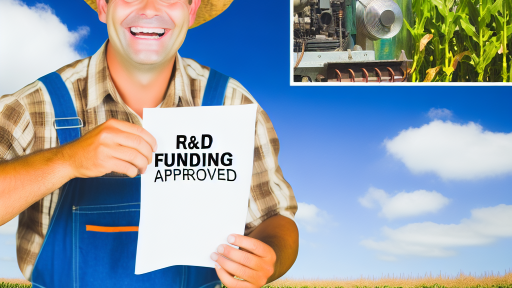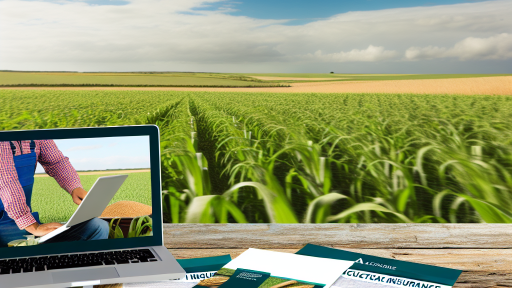Definition of Liability Coverage in Farm Insurance
Liability coverage in farm insurance protects farmers from financial loss.
This type of coverage addresses claims made against the farm owner.
It covers bodily injury and property damage to third parties.
For instance, if a visitor gets injured on your property, liability coverage applies.
Moreover, it safeguards against accidents involving vehicles used on the farm.
Farm liability coverage typically includes legal defense costs.
Legal fees can accumulate quickly, making this coverage essential.
Without liability coverage, farmers face significant financial risk.
This risk can stem from lawsuits related to farm operations.
In addition, liability coverage can cover damages from farm-related activities.
For example, if your livestock damages a neighbor’s property, you could be liable.
Liability coverage also protects against allegations of negligence.
Farmers must understand the importance of maintaining adequate liability limits.
These limits depend on the size and scope of their operations.
Assessing the unique risks of each farm is crucial in choosing coverage levels.
Transform Your Agribusiness
Unlock your farm's potential with expert advice tailored to your needs. Get actionable steps that drive real results.
Get StartedUltimately, liability coverage provides peace of mind for farmers.
It permits them to focus on their agricultural activities without undue worry.
Types of Liability Coverage Relevant to Farming
General Liability Coverage
General liability coverage protects against common risks on a farm.
This type of policy covers bodily injury and property damage.
For instance, it helps if a visitor gets injured while on the property.
It also covers damage caused by farm operations to third-party properties.
Farmers need this coverage to manage unexpected incidents effectively.
Product Liability Coverage
Product liability coverage is essential for farmers who sell goods.
This coverage protects against claims related to product defects.
If a consumer gets harmed by a faulty product, this policy provides protection.
Moreover, this coverage addresses issues with food safety and regulations.
Proactive farmers should consider this coverage to mitigate risks.
Environmental Liability Coverage
Environmental liability coverage shields farmers from pollution claims.
This includes incidents caused by fertilizers and pesticides.
It addresses the potential damage to natural resources from farming operations.
Additionally, this coverage can help with cleanup costs after an incident.
Farmers prioritizing sustainability must consider this crucial coverage.
Workers’ Compensation Coverage
Workers’ compensation coverage protects employees in case of work-related injuries.
This policy ensures that injured workers receive necessary medical care.
Additionally, it provides wage replacement for employees unable to work.
It is a legal requirement in many states, reinforcing its importance.
Farm owners must invest in this coverage to protect their workforce.
Commercial Auto Liability Coverage
Commercial auto liability coverage applies to vehicles used for farming.
This includes trucks and tractors that transport goods and materials.
Showcase Your Farming Business
Publish your professional farming services profile on our blog for a one-time fee of $200 and reach a dedicated audience of farmers and agribusiness owners.
Publish Your ProfileIt protects against claims resulting from accidents involving these vehicles.
Farmers need this coverage to safeguard their business from financial loss.
Furthermore, it aids in complying with state vehicle insurance laws.
Risks and Liabilities Faced by Farmers Without Coverage
Property Damage Risks
Without liability coverage, farmers face significant property damage risks.
Natural disasters, such as floods or droughts, can devastate a farm.
Additionally, equipment failures can lead to costly repairs and losses.
These risks can threaten a farmer’s livelihood without proper financial protection.
Public Liability Concerns
Farmers working with the public must consider liability concerns.
Visitors or customers can get injured on the property.
Accidents involving farm animals or equipment can result in lawsuits.
Without coverage, these legal fees could be financially crippling.
Employee Safety Liabilities
Employing staff introduces employee safety liabilities for farmers.
If employees are injured on the job, the farmer could be held responsible.
This could lead to significant compensation claims and medical expenses.
Adequate liability coverage can mitigate these financial risks.
Environmental Risks
Farmers also face environmental liabilities related to farming practices.
Chemical spills or pesticide drift can damage neighboring properties.
Such incidents may lead to costly environmental cleanup and legal actions.
Liability coverage helps manage these potential environmental risks.
Financial Impact of Legal Claims
The financial impact of legal claims can severely affect farmers.
Even minor lawsuits can accumulate substantial legal fees quickly.
With limited resources, many farmers cannot afford unforeseen expenses.
Liability coverage ensures farmers have the support to manage these costs.
Reputation Risks
A negative incident can harm a farmer’s reputation within the community.
Public perception can change rapidly after a liability claim.
Farmers without coverage might not recover their business easily.
Protective measures can help preserve a farmer’s public image.
You Might Also Like: Understanding Organic Farming Regulations
Legal Requirements for Liability Insurance in Farming
Overview of Liability Insurance Laws
Liability insurance protects farmers from legal claims.
In many jurisdictions, it is a legal requirement.
This coverage ensures that farmers can compensate for damages or injuries.
Meeting these legal requirements is essential for any farming operation.
Required Coverage Levels
Different states have varying levels of required liability coverage.
Farmers must understand their local laws.
Many states might mandate minimal coverage limits.
These limits are often based on the type of agricultural activities undertaken.
Consequences of Non-Compliance
Failure to obtain liability insurance can lead to penalties.
Farmers may face fines or legal action.
Additionally, without insurance, farmers risk losing their farms.
Financial liabilities can be crippling in the event of an accident.
Showcase Your Farming Business
Publish your professional farming services profile on our blog for a one-time fee of $200 and reach a dedicated audience of farmers and agribusiness owners.
Publish Your ProfileInsurance Options for Farmers
Farmers can explore various liability insurance options.
General liability insurance is widely available.
Some farmers may opt for specialized coverage.
Specific types of coverage can protect against unique risks.
For instance, workers’ compensation can safeguard against employee injuries.
Importance of Regular Review
Farmers should regularly review their liability insurance.
As farming operations grow or change, so do insurance needs.
Staying updated helps ensure compliance with legal requirements.
Regular consultations with insurance agents are beneficial.
This practice fosters better understanding of coverage options.
Uncover the Details: Rural Development Policies That Promote Sustainable Agriculture
Comparison of Liability Coverage Options for Different Farming Operations
Types of Farming Operations
Farming operations vary greatly in scale and scope.
These differences affect the type of liability coverage needed.
Common types of farming operations include:
- Dairy Farms
- Crop Farms
- Organic Farms
- Livestock Farms
Liability Coverage for Dairy Farms
Dairy farms face unique risks due to their livestock.
Liability coverage protects against incidents involving animals or equipment.
Some policies may cover:
- Injuries to farm employees
- Injuries to visitors
- Damage to third-party properties
Liability Coverage for Crop Farms
Crop farms mainly deal with agricultural products and machinery.
Insurance options focus on equipment and product liability.
Crop farms may benefit from coverage that includes:
- Liability for pesticide use
- Product recalls
- Equipment damage during operations
Liability Coverage for Organic Farms
Organic farms emphasize sustainability and eco-friendly practices.
They need coverage tailored to organic certification requirements.
Key coverage types often include:
- Liability for organic product failures
- Environmental damage claims
- Consumer lawsuit protections
Liability Coverage for Livestock Farms
Livestock operations expose farmers to risks from animals.
Liability coverage here is critical to protect farm owners.
This type of coverage typically includes:
- Injury claims from animal attacks
- Damage caused by livestock escapes
- Coverage for other farm-related accidents
Choosing the Right Coverage
Selecting the appropriate liability coverage is crucial.
Farmers should assess their specific operation risks.
Consulting with a knowledgeable insurance agent is wise.
This ensures that all necessary coverage options are considered.
You Might Also Like: Impact Of Conservation Programs On Farm Productivity
Case Studies: Consequences of Insufficient Liability Coverage
Overview of Liability Coverage
Liability coverage protects farmers from legal claims.
It is essential for safeguarding assets and operations.
Without it, farmers can face devastating financial losses.
Case Study: The Johnson Family Farm
The Johnsons operated a dairy farm in Wisconsin.
One day, a visitor slipped and fell on their property.
Unfortunately, the Johnsons had minimal liability coverage.
The medical bills and legal fees quickly accumulated.
Ultimately, they had to sell part of their land to pay the expenses.
Case Study: Green Horizon Organic Farms
Green Horizon faced a significant lawsuit after a contamination issue.
Showcase Your Farming Business
Publish your professional farming services profile on our blog for a one-time fee of $200 and reach a dedicated audience of farmers and agribusiness owners.
Publish Your ProfileSome of their organic produce led to foodborne illness.
The farm lacked adequate liability coverage at the time.
They faced hefty penalties and several lawsuits from consumers.
This situation forced them into deep financial distress.
Case Study: Sunnydale Crop Producers
Sunnydale Crop Producers kept an inadequate insurance policy.
A neighbor’s livestock escaped and damaged their fields.
The damages were extensive, impacting their yield significantly.
When the neighbor refused to reimburse them, Sunnydale suffered.
They ended up with production losses and no recourse for recovery.
Lessons Learned
Each case highlights the risks of insufficient coverage.
Farmers must assess their potential liabilities regularly.
Investing in comprehensive coverage can safeguard their business.
Ultimately, it protects their families and future generations.
See Related Content: Adapting Farm Operations To New Import Export Tariffs
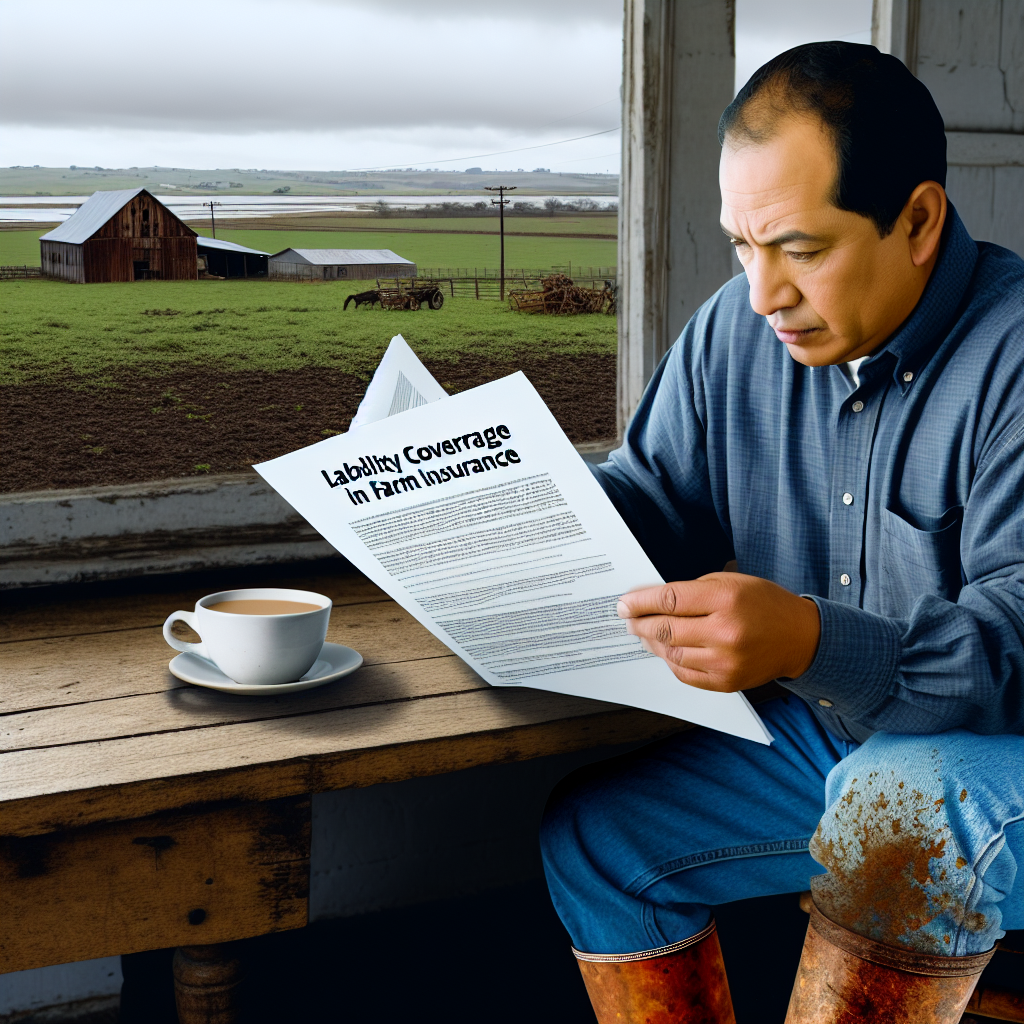
The Role of Liability Coverage in Protecting Farm Assets
Understanding Liability Coverage
Liability coverage serves as a safety net for farmers.
This type of insurance protects against claims of injury or damage.
Farmers face various risks that can lead to costly lawsuits.
Having liability coverage mitigates those financial burdens.
Types of Liabilities Covered
Liability coverage includes several key areas.
Firstly, it covers bodily injury to third parties.
This may occur due to accidents on the farm.
Secondly, it protects against property damage claims.
For example, a visitor’s property might be accidentally damaged.
Additionally, it covers legal expenses related to lawsuits.
This can save farmers from significant financial strain.
Why Liability Coverage is Essential
Farm operations can lead to unexpected incidents.
A single accident might result in a large financial loss.
Therefore, liability coverage ensures peace of mind.
It allows farmers to focus on their operations without fear.
Examples of Liability Scenarios
Consider a scenario where a visitor slips on a wet floor.
In this case, liability coverage protects the farmer from claims.
Another example involves equipment malfunction causing damage.
Liability coverage can handle resulting legal fees.
Choosing the Right Liability Coverage
Selecting the right policy is crucial for effective protection.
Farmers should assess their specific risks and needs.
Consulting with an insurance agent can provide clarity.
They can help tailor coverage to suit individual farm operations.
Regularly reviewing the policy ensures continued adequacy.
Importance of Liability Coverage for Farmers
In summary, liability coverage is vital for protecting farm assets.
Farmers should prioritize adequate insurance for peace of mind.
Showcase Your Farming Business
Publish your professional farming services profile on our blog for a one-time fee of $200 and reach a dedicated audience of farmers and agribusiness owners.
Publish Your ProfileThis proactive approach safeguards their livelihoods against risks.
How to Choose the Right Liability Coverage for Your Farm
Assess Your Farm’s Risks
Start by identifying the specific risks associated with your farm operations.
Consider factors such as location, crop type, and livestock.
You may also want to evaluate weather-related hazards.
In addition, think about risks linked to equipment and machinery use.
By assessing these risks, you can determine necessary coverage levels.
Understand Available Coverage Options
Familiarize yourself with different liability coverage types in farm insurance.
General liability coverage protects against various claims like personal injuries.
Product liability coverage safeguards you against claims from products sold.
Additionally, consider professional liability if you provide agronomic services.
Learning the types helps in making informed decisions for your coverage needs.
Evaluate Policy Limits and Deductibles
Evaluate the limits of liability coverage in potential policies.
Ensure that the limits are sufficient to cover your potential losses.
Also, pay attention to deductibles and how they fit your budget.
Choosing a higher deductible may lower your premium but increase out-of-pocket costs.
Weigh the pros and cons when deciding on limits and deductibles.
Compare Quotes from Multiple Insurers
Request quotes from several insurance providers to find the best coverage.
Compare not just premiums but also coverage specifics and terms.
Inquire about endorsements or add-ons that may enhance your policy.
Moreover, check each provider’s financial stability and customer reviews.
This comparison ensures that you select the best option for your farm.
Consult with an Insurance Expert
Consider consulting with an insurance broker familiar with farm policies.
An expert can offer valuable insights tailored to your unique situation.
Furthermore, they can help you navigate complex options and terms.
Taking this step may save you time and potentially reduce costs.
Ultimately, their advice can lead to better coverage for your farm’s needs.
The Impact of Liability Coverage on Farm Business Sustainability
Understanding Liability Coverage
Liability coverage protects farmers against legal claims and lawsuits.
It provides financial support for legal fees and settlements.
Access to this coverage can be crucial for a farm’s longevity.
Protecting Farm Assets
Farm assets are significant investments that need protection.
Liability coverage helps secure these assets against unforeseen events.
For instance, accidents on the property can lead to costly lawsuits.
This insurance safeguards the farmer’s financial security.
Building Trust with Stakeholders
Trust is essential in maintaining relationships with stakeholders.
Liability coverage demonstrates a commitment to responsible management.
Both customers and suppliers appreciate transparency and accountability.
Consequently, this coverage can enhance the farm’s reputation.
Encouraging Business Growth
Having proper liability coverage enables farmers to grow their businesses.
It encourages them to take calculated risks for expansion.
Investing in new techniques or markets can lead to greater income.
Showcase Your Farming Business
Publish your professional farming services profile on our blog for a one-time fee of $200 and reach a dedicated audience of farmers and agribusiness owners.
Publish Your ProfileMoreover, it fosters innovation by reducing fear of potential liabilities.
Compliance with Regulations
Farmers must comply with various legal and safety regulations.
Liability insurance is often a requirement for meeting these standards.
Failure to comply can result in fines or even business closure.
Thus, liability coverage ensures adherence to industry laws.
Long-Term Sustainability
Ultimately, liability coverage promotes long-term sustainability for farms.
It allows farmers to manage risks effectively and maintain stability.
Reliable insurance coverage can lead to peace of mind.
The security it provides supports planning for future generations.

